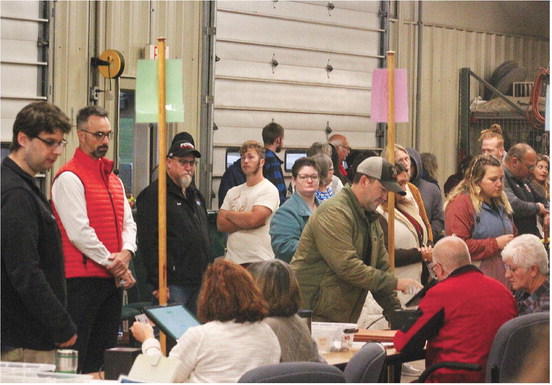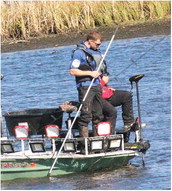$300K loan possible for Colby project
Colby may borrow up to $300,000 from a regional electric cooperative to help pay for an estimated $1 million worth of road and utility extensions on 37 acres of land recently purchased by the city.
Tim Stewart, CEO of Greenwoodbased Clark Electric Cooperative, and Jenny Kuderer-Radcliffe, an economic development representative from Dairyland Power Cooperative in LaCrosse, spoke to the city’s finance committee Tuesday about their ability to finance public infrastructure projects that contribute to economic development.
Stewart said he was contacted by city clerk Connie Gurtner, who inquired about loan funding after the city bought a parcel of land with frontage along STH 13 but no direct road access.
Kuderer-Radcliffe said the electric cooperatives have access to funds through the USDA’s Rural Development program, which provides money for revolving loan funds.
“We can use those to help facilitate and advance economic development projects in the communities which we serve,” she said. Dairyland is able to lend up to $200,000, and Clark can contribute another $100,000 from its own fund, potentially allowing Colby to borrow $300,000 for up to 10 years at an interest rate that is currently at 1.3 percent. The city will need to fill out an application and submit a project plan with financial projections, she said, and the cooperatives’ boards of directors will need to approve the loans.
The funds can be used for streets and water and sewer utilities, but not for housing developments or electrical service and telecommunications, she said.
With the project estimated to cost around $1 million, Kuderer-Radcliffe said the cooperatives would want to see what other sources of funding the city will be using to cover the full costs.
Ultimately, Stewart said the cooperatives could potentially provide about a third of the funding.
“This program is not meant to replace banks; it’s meant to supplement, help fill in the gaps, and bring the overall cost of the project down,” he said.
Gurtner said the city currently has plenty of borrowing capacity available, backed by its ability to collect taxes, to provide security for the loan. The $298,000 cost of the land purchase was taken out of the city’s fund balance, but it could be repaid with a future loan.
If the city were to borrow $300,000 this year, Gurtner said the council could also increase the property tax levy for next year in order to cover those principle and interest payments.
With the city’s TIF district closed as of last month, Gurtner said the city will be paying off a total of four loans by the end of 2020. Those debts were being paid by a combination of TIF funds and general fund taxes, and once they’re closed out, the city will have just $749,000 in total debt obligations remaining.
The city has $4.3 million in borrowing capacity based on its equalized property values, she said, so it can still borrow well over $3 million before reaching that limit.
Without adding to its debt load this year, Gurtner said the amount of property taxes the city can collect next year would drop by about $32,000. That sounds nice, she said, but when the tax levy fluctuates like that, it negatively impacts how much the city can raise in future years and prevent it from qualifying for expenditure restraint aids from the state.
Instead of letting the tax levy drop next year, Gurtner recommended the city borrow $300,000 this year, which would allow the city to raise the levy by about $30,000 (5.76 percent), up to $584,000 in 2021.
Looking ahead to 2022, Gurtner said all of the equalized property value currently within the TIF district will be taxed like normal, generating an infusion of money for the general fund.
“We’re going to be able to increase our tax levy without actually increasing the tax rate at all,” she said.
Tuesday’s committee discussion about the loan opportunity dovetailed into an overall conversation about the city’s proposed 2021 budget.
On the revenue side, Gurtner included a $584,000 property tax levy on the assumption that the city will borrow $300,000 this year. When it comes to state aid next year, Colby will see its shared revenue increase by $1,000, but its transportation aid will drop by $11,000.
On the expense side, the city’s debt payments would increase to $246,555 with the addition of a new loan.
Most other line items stayed the same, though police protection went up by over $10,000 and fire protection decreased by over $20,000 — resulting in an overall $10,000 decrease in public safety costs.
The general fund was left with a projected surplus of about $3,300, which Gurtner planned to put into contingency.
A capital outlay budget for 2021 includes $428,200 in possible expenditures, which includes everything from an estimated $60,000 in city hall renovations to $120,000 for a new dump truck and a total of $196,200 for developing street project plans on North Second Street and Community Drive. Gurtner said city should consider borrowing for some of these expenditures.
“I think we have to continue to do capital projects, but that’s a decision the council has to make,” she said.


